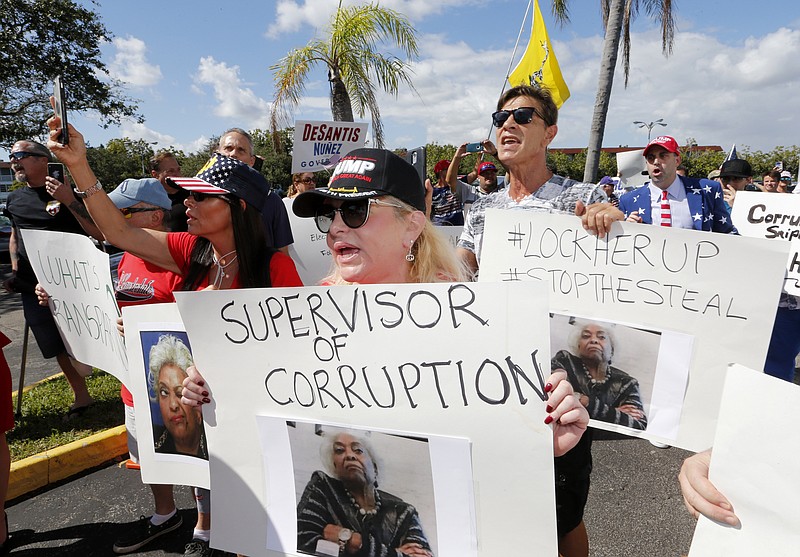Why does voting go smoothly in most states but becomes contentious in a select few?
Most states count the votes on election night, knowing that some absentee ballots will need to be toted up and some provisional ballots will need to be verified in the next day or so. Since it would be almost impossible for all such ballots to favor one candidate, the outcome is not in doubt. The machinery works, the tabulation is done and the victor is declared.
Except when it isn't.
Arizona, Georgia and Florida, all with close races, seem to have had a difficult time counting their votes last week. Yes, they all had close races, races for the Senate in Arizona and Florida and races for governor in Georgia and Florida. Now, a week later, they don't have declared winners.
Republicans all led on election night. And then the intrigue began. Now a Democrat is ahead in Arizona, where they're still counting ballots. An automatic recall has been triggered in both races in Florida. And Democrats are still looking for ways to push the Republican into a runoff in Georgia.
We're not going to get into the machinations of all three races except to express disbelief at how seemingly easy it is to find extra ballots, one-sided provisional voters and lots of biased help from the national media for those they had longed to win the races.
Florida has been here before, the 2000 presidential race bringing back memories of hanging chads, butterfly ballots and election supervisors so incompetent even pundits favoring the trailing candidate admit it.
At least one of the counties involved is the same as 18 years ago. Several days after the election last week, Broward County began releasing large batches of previously uncounted ballots. There, the office of the election supervisor, in previous elections, had prematurely disposed of ballots cast, not followed the proper procedure for tabulating absentee ballots and otherwise failed to execute its duties in compliance with the law.
On this go-round, the elections supervisor initially refused to say how many absentee and early-voting ballots remained uncounted and did not complete counts when they were supposed to be completed.
Elsewhere in the county, certain ballot boxes were labeled "provisional ballots" on one side and "supplies" on another, giving rise to possible methods of secreting ballots. Election officials said it was all a misunderstanding, but it raises the belief that fraud could be afoot.
But rather than litigate the individual races, we'd like to look at the suggestions of a former George W. Bush administration official on national standards for elections.
When someone says "national standards," many people cringe. They see courts striking down state statutes on abortion and gay marriage, for instance, and putting federal rulings in their place.
But Bradley Blakemore believes such standards should be in place for national elections - presidents, U.S. senators and U.S. representatives - and thinks most governments would adopt them for state and local elections, too.
He'd require a photo ID to register to vote and to vote, just as is required to obtain government benefits, fly on an airline or enter a federal building.
That in itself would be controversial because many Democrats have fought against it, saying it discriminated against minorities or older people who they say are hard-pressed to get such an ID. But states, including Tennessee, have made the process so easy, so the argument holds no water.
Blakemore would allow eligible citizens to register up to two weeks before a federal election by appearing in person at an authorized federal or state office and filing an application. In Tennessee, voters must be registered a month before Election Day, but that's only about two weeks before early voting. And registration by mail in Tennessee needs to be completed only a week before early voting.
He would permit early voting no earlier than two weeks before a federal election and would mandate the hours to be 10 a.m. to 4 p.m. On Election Day, he would designate the hours to be 7 a.m. to 9 p.m. In Tennessee, polls open between 7 a.m. and 9 a.m. local time and all close at 8 p.m. local time.
An absentee voter, able to show good cause, would be allowed to vote provided the voter petitions for an absentee ballot in person at the authorized office no more than a month and no less than two weeks before the election.
Voting machines would be uniform across the country, and a uniform standard would determine the number of machines per the number of registered voters at a polling place.
Blakemore, lastly, says uniform federal rules would govern voter IDs, registration, voting, poll watching, eligibility, timing, locations, tallying, reporting, challenges, recounts, certifications, candidate eligibility, forms, etc.
Again, many won't like the uniformity, but it would cut down on counties finding ballots, providing late results and cries - deserved or undeserved - of unfairness. Besides, many of the suggestions are not far off what most states do already.
Blakemore says the federal government - under the Equal Protection Clause of the Constitution - already should be ensuring all aspects of voting in federal elections are uniform.
It would take a while to create such an alignment, but both major political parties and Congress should look at such changes as both necessary and correct to protect such a valuable right.
